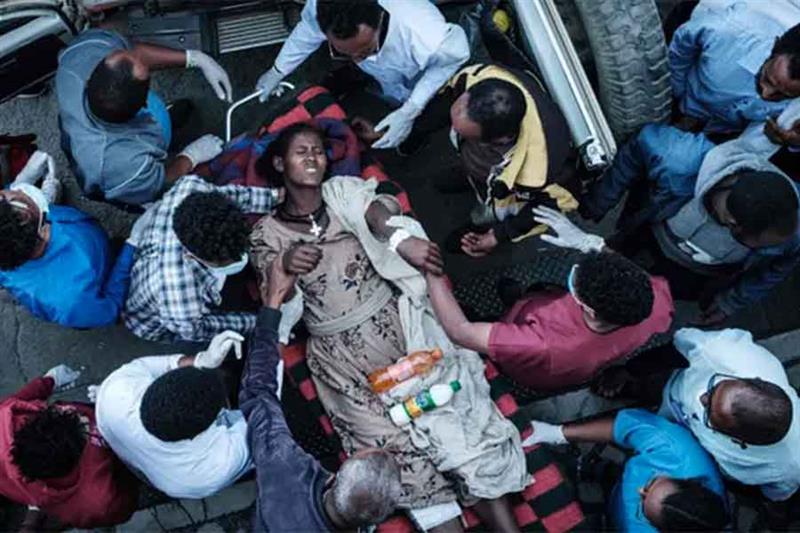
An injured resident of Togoga is carried on a stretcher to the Ayder referral hospital in Mekelle, a day after a deadly airstrike. AFP
The United Nations is opening a probe into the "extreme brutality" of the conflict, despite protests from Addis Ababa.
Here is a timeline of the fighting:
2020: Troops enter Tigray
Military action begins on November 4, 2020, when Abiy orders a response to what he calls a "traitorous" attack on federal army camps in Tigray.
He blames it on the region's ruling party the TPLF, which dominated Ethiopian politics for nearly three decades before he took office in 2018.
'War crimes'
After 10 days of fighting, the UN warns of possible war crimes in Tigray.
Neighbouring Eritrea -- with which Abiy signed a peace deal in 2018 that helped him win the Nobel Peace Prize -- is reported to have sent troops into Tigray to help the Ethiopian forces.
Two weeks later Abiy takes Tigray's capital Mekele.
On November 28, he declares military operations are "completed", but fighting continues.
2021: 'Ethnic cleansing'
In February 2021 Amnesty International says Eritrean soldiers killed "hundreds of civilians" in November in the holy city of Axum.
For months Ethiopia and Eritrea deny the involvement of Eritrean forces though Washington speaks of "ethnic cleansing".
On March 23, Abiy admits the presence of Eritrean troops and officials say they massacred more than 100 civilians in Axum.
Elections are held across much of Ethiopia, but not in Tigray.
Tigrayans advance
The rebels mount a shock comeback and retake Mekele in late June, before pushing into the neighbouring regions of Amhara and Afar.
By July 3, the UN says 400,000 people are on the brink of famine in Tigray.
The rebels rebuff US calls to withdraw and on August 10 Abiy urges civilians to join the Ethiopian army.
Rebel alliance
Abiy is sworn in for a new five-year term in office on October 4.
Two weeks later, Ethiopian aircraft launch deadly strikes on Mekele and elsewhere in Tigray.
In late October the rebels claim control of two key cities in Amhara -- less than 400 kilometres (250 miles) north of Addis Ababa.
The government denies the claim but declares a state of emergency across the country on November 2.
The following day a joint UN-Ethiopian report says crimes against humanity could have been committed by "all sides".
Ceasefire calls
Several countries, including the US, tell their nationals to leave Ethiopia.
The UN Security Council calls for a ceasefire.
On November 12, Washington slaps sanctions on Eritrea's ruling party and army.
Abiy at the front
Abiy arrives on the frontline on November 24 to personally lead the counter-offensive, official media says.
The next day the government puts new restrictions on sharing information about the war.
On December 1 the government says it has recaptured several towns, including the UNESCO World Heritage site Lalibela.
UN humanitarian flights and convoys between Addis Ababa and Mekele resume.
Five days later, the government claims to have retaken the strategic towns of Dessie and Kombolcha.
Abiy announces his return to the capital after two weeks at the frontline but the rebels recapture Lalibela on December 12.
UN abuses probe
The UN Human Rights Council votes on Friday to launch a investigation into abuses as fears of a more generalised conflict grow. Addis Ababa strenuously objects, calling it "neo-colonialist".
Short link: